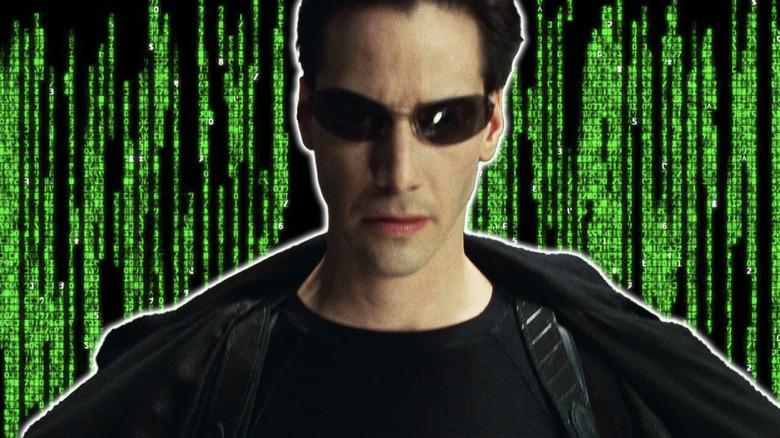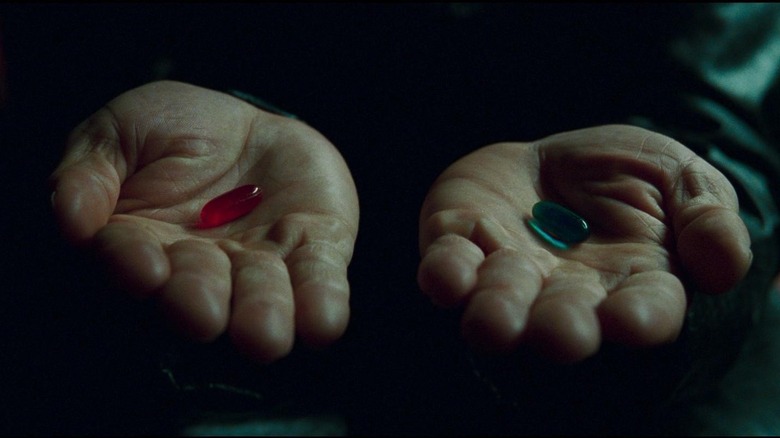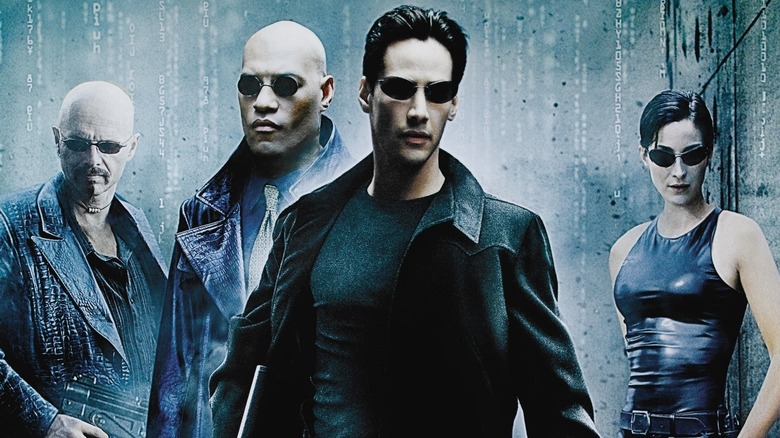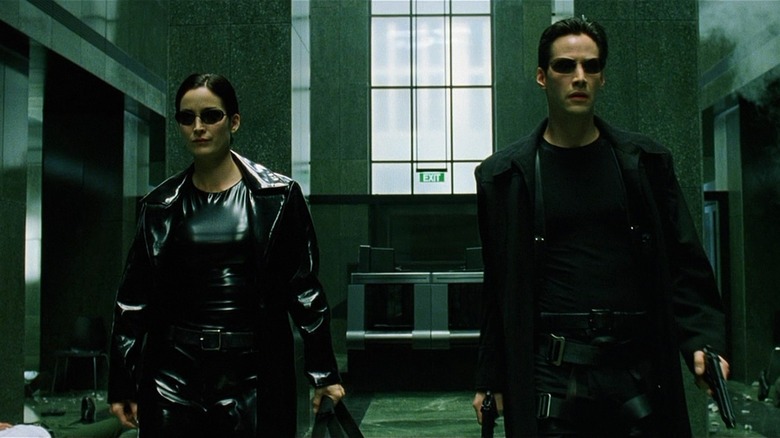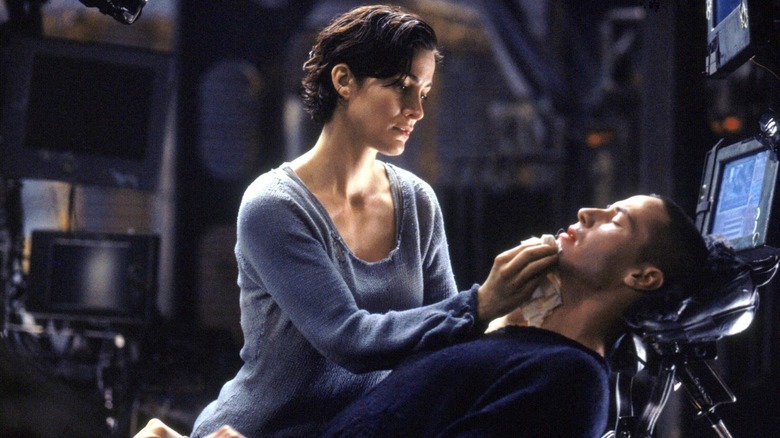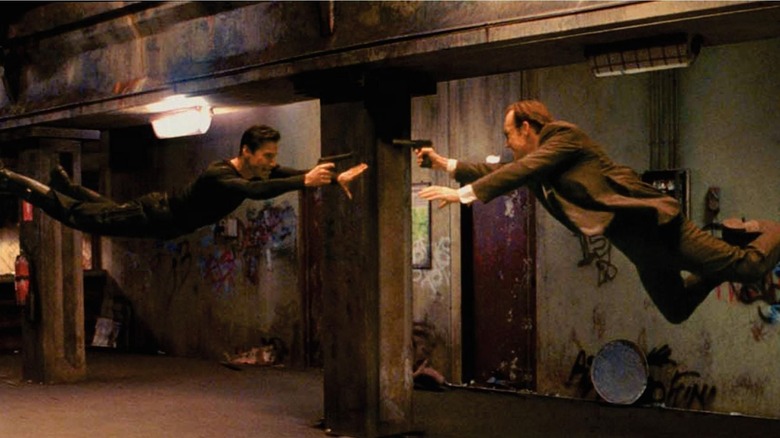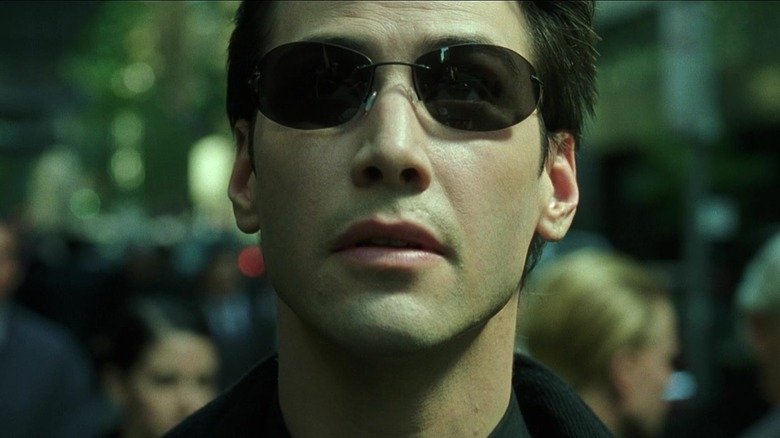25 Years Ago, The Matrix Broke The Box Office (And Cinema Was Never The Same)
(Welcome to Tales from the Box Office, our column that examines box office miracles, disasters, and everything in between, as well as what we can learn from them.)
"Whoa." This is the famous word uttered by Keanu Reeves in "The Matrix" that has become a meme, one of the actor's most quoted lines, and perhaps the best way to sum up this movie's unexpected impact on cinema when it arrived in 1999. The movie is now immortalized as one of the most heralded and groundbreaking blockbusters of all time. But 25 years ago, this seemed like anything but a sure bet.
From a pair of underdog directors to visuals that had never been pulled off in film before, this is a movie that had just about everything working against it. Every movie is a miracle, but this movie is perhaps the miracle of all miracles. It is — not to overstate the point — difficult to imagine modern Hollywood without this wildly influential sci-fi classic.
The film focuses on an unsuspecting computer hacker who discovers the shocking truth that life as he knows is just an elaborate deception cooked up by an evil cyber-intelligence. It's an easy enough concept to pitch in the late '90s when broad society was still becoming accustomed to the internet age. Executing the concept, which involved everything from dodging bullets in slow motion to having people fight in mid-air, was a major leap of faith.
In this week's Tales from the Box Office, in honor of the 25th anniversary of "The Matrix," we're looking back at the Wachowskis' crowning achievement. We'll go over how the film came to be, why Will Smith passed on the role of a lifetime, how a relatively untested directing duo pulled off such a complex film, what happened when it finally hit theaters, and what lessons we can learn from it all these years later. Let's dig in, shall we?
The movie: The Matrix
Before diving in, I should note that the story of this movie can (and has) filled multiple books. So I can only truly scratch the surface here with a couple thousand words, but we're going to try and paint a picture of this movie's truly unlikely eventual destination. I.E., becoming one of the biggest commercial hits of the '90s while also ranking as one of the most influential movies ever made.
Legendary producer Lorenzo di Bonaventura bought the rights to "The Matrix" script years before it was made. He became a champion for the project the whole way through. Shortly after the minor success of Lana and Lilly Wachowski's "Bound," they set about trying to convince Warner Bros. to make the film. They had precisely one film under their belt as well as the script for "Assassins," which they sold but was then heavily rewritten. In short, it was going to be a tough sell.
As explained in a 2019 piece by Wired, the duo enlisted comics artist Geof Darrow to design much of the foreboding technology in the film, as well as Steve Skroce, who drew nearly 600 detailed shot-by-shot storyboards. The problem for WB is that nothing existed to compare this to. It was wholly original. As di Bonaventura explained in that 2019 piece, the time was ripe for something fresh, as he saw it:
"Sequels were faltering. And a lot of genres were dying: action-comedy movies, buddy-cop movies. We knew we needed to do something different."
The Wachowskis ended up pitching the head of the studio and, to put it lightly, their pitch for "The Matrix" was pretty darn unique. Di Bonaventura recalled that "nobody understood it" in the 2019 book "Best. Movie. Year. Ever.: How 1999 Blew Up the Big Screen." He also explained how, exactly, they went about pitching the film.
"It was an unusual show. One of the Wachowskis was explaining the story, and the other was making sound effect noises."
A comic book becomes a Hollywood blockbuster
It's easy to take for granted now since so many things from "The Matrix" have become intensely ingrained in the larger pop culture landscape, but having two directors with only a mid-budget thriller to their name try to explain Neo dodging bullets or Trinity holding an unusual fighting pose in the air must have sounded insane. It seems like something more befitting a comic book on paper. And, as Lilly Wachowski explained to The New York Times in 1999, the concept did begin as a comic before it evolved.
”The script was a synthesis of ideas that sort of came together at a moment when we were interested in a lot of things: making mythology relevant in a modern context, relating quantum physics to Zen Buddhism, investigating your own life. We started out thinking of this as a comic book. We filled notebook after notebook with ideas. Essentially that's where the script came from.”
The influence of anime on this movie cannot be overstated, "Ghost in the Shell" in particular. Anime has broken through in a more meaningful way in North America since 1999 but, before then, it was as niche as things get. So many of the concepts and visual language that the Wachowskis were playing with were completely new to Western audiences. But that also helped make this world feel very fresh, even if it was difficult to convey in a pitch meeting.
Warner Bros., in partnership with Village Roadshow, ultimately ended up putting up $60 million to bring the Wachowskis' vision to life. That may sound like a relatively modest sum by today's standards as blockbuster budgets have skyrocketed in recent years, but that would have been the equivalent of a $110 million budget, give or take, in today's dollars. It was a significant investment, to be certain. Part of the deal was to have production take place in Australia to help keep the costs down.
Casting Neo
Casting became crucial because the movie was such an investment for the studio. If the directors were somewhat untested, they needed tried and true faces in front of the camera. One of the most legendary would-be castings of all time comes from this movie, as Will Smith was originally offered the role of Neo. Smith, coming off of "Men in Black," was at the height of his powers. He famously turned it down. Back in 2019, Smith released a video on his YouTube channel explaining his decision to walk away from one of the most iconic movies in history.
"After we made 'Men in Black,' the Wachowskis, they came in and they had only done one movie. I think that movie was called 'Bound.' And they came in and made a pitch for 'The Matrix.' And as it turns out, they're geniuses! But there's a fine line in a pitch meeting between genius and what I experienced in the meeting."
Again, hindsight makes everything look radically different. Smith would have been taking it all on good faith. So, he made the infamous box office bomb "Wild Wild West" instead. But Smith understands that he, in the process, might have saved the movie from himself. "If I had done it because I'm Black, then Morpheus wouldn't have been Black 'cause they were looking at Val Kilmer," Smith added at the time. "So, I probably would have messed 'The Matrix' up, I would have ruined it. I did y'all a favor."
Instead, the studio turned to Keanu Reeves ("Speed") to play Neo, while Laurence Fishburne ("Boyz n the Hood") would play Morpheus. Carrie-Anne Moss ("Models Inc.") would round out the core trio as Trinity, with Hugo Weaving ("Babe") portraying the villainous Agent Smith. From rigorous fight training to suffering injuries while filming, they probably had no idea just how much they were signing up for. But all of their suffering would not be in vain.
The financial journey
The Wachowskis ended up being over budget, in no small part due to the cast injuries and the complexity of the action. The studio threatened to cut scenes but, as editor Zach Staenberg explained, "They said, in their almost offhanded way, 'If we don't have those scenes, we don't have the movie — and they can get someone else to finish it.'" So with a final budget in the $65 million range, WB set about launching a marketing campaign for the ages. From a big Super Bowl spot to trailers that emphasized the "you need to see it to believe it" angle, they managed to pique the interest of the moviegoing public at large.
"The Matrix" opened on March 31, 1999, against "10 Things I Hate About You" and "The Out-Of-Towners." It was no contest. The sci-fi film, benefitting from excellent buzz, opened to $27.8 million. It was, at the time, the largest Easter weekend opening ever. The fact that it was an R-rated movie at a time when they didn't often break out this big was even more impressive. The film held onto the top spot for two of the following three weekends, briefly surrendering the crown to the Eddie Murphy comedy "Life." It was a runaway smash and a pop culture sensation.
When all was said and done, "The Matrix" finished with $171.5 million domestically to go with a whopping $292 million internationally for a grand total of $463.5 million worldwide. It finished as the fourth biggest movie of 1999 overall, trailing only "Toy Story 2" ($487 million), "The Sixth Sense" ($672 million), and "Star Wars: The Phantom Menace" ($924 million).
In the years that followed, the Wachowskis returned to direct back-to-back sequels that both hit theaters in 2003. While the sequels remain ever-divisive, they were unquestionably hits, with "The Matrix Reloaded" taking in a staggering $738.5 million worldwide while "The Matrix Revolutions" earned $427.3 million. Even with $150 million budgets, the franchise overall delivered in spades. The only flop of the bunch was 2021's "The Matrix Resurrections," which made just $159 million against a huge $190 million budget.
An instant classic is born
The movie became an instant classic that has endured in the pop culture consciousness for 25 years now. In its day, "The Matrix" was honored with quite a few accolades to go with its box office haul, including Oscars for Best Editing, Best Sound Effects Editing, Best Sound, and Best Visual Effects. It won in every single category for which it was nominated. But the film's legacy extends well beyond a few Academy Awards.
For one, the visual language was parodied numerous times in everything from "Scary Movie" to "Shrek." The techno soundtrack, use of slow-motion bullets, and fighting style all became synonymous with this movie. If something copied or paid homage to what the Wachowskis did, it was instantly recognized for doing so. It's extremely rare air for a single film to have such an immediate cultural impact in the way this movie did. We're talking "Star Wars" and a handful of other cherished classics.
Behind the scenes, it helped change the way that action movies were filmed and executed. To that end, stuntman Chad Stahelski, who worked on "The Matrix" films, ended up becoming one of our finest living action directors, helming the "John Wick" franchise, which he managed to turn into a $1 billion enterprise as well.
To try and name the numerous Hollywood hits that have benefited from this movie's existence would be an exhausting experiment. Even modern hit shows such as "Severance" continue to proudly declare that they were inspired by "The Matrix." How many movies can say they cast a long enough shadow to so directly influence hits 25 years after the fact? It carries the aura of a cult hit yet made blockbuster money and broke into the mainstream in a way few movies can ever claim they have. Whoa, indeed.
The lessons contained within
When Warner Bros. and Lorenzo di Bonaventura bet big on the Wachowskis by letting them make "The Matrix," it defied Hollywood logic as it currently exists. Sure, relatively untested filmmakers often get the chance to make big movies, but almost always in pre-existing franchises. Colin Trevorrow got to make "Jurassic World" after "Safety Not Guaranteed." Marvel also let James Gunn make "Guardians of the Galaxy" after making smaller movies like "Slither." But original blockbusters? Forget it.
That, for my money, is the takeaway here. Because the studio had faith in a pair of visionary filmmakers, we not only have a beloved franchise that carries weight decades later, but we have a whole generation of filmmakers who were inspired by that movie. We have filmmakers who learned how to make movies on those sets. Action cinema looks different because of this movie. It's not an exaggeration to say that modern cinema might be different today, broadly speaking, if "The Matrix" didn't exist. This quote from Lana Wachowski to The New York Times in 1999 sums it up well.
”We just really want to see how the idea of an intellectual action movie is received by the world. 'Because if audiences are sort of interested in movies that are made like McDonald's hamburgers, which do have a value in the world, then we have to re-evaluate our entire career."
Fortunately, the Wachowskis didn't have to re-evaluate their careers. Unfortunately, the Hollywood of today is much more comparable to the McDonald's metaphor being used there. We need new franchises. We need new voices. We need new ideas. The same recycled versions of things from the past simply won't cut it forever. So yes, it's easy for me to say when it's not my money, but studios need to invest in original ideas. And, on occasion, an expensive original idea, because the future will be all the better for it.
